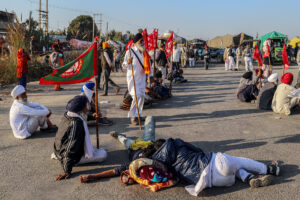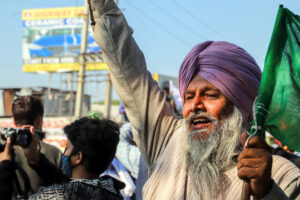Interview: Agriculture is not unorganised but unprotected sector, says Medha Patkar
There have been allegations as to why only Punjab and Haryana farmers protesting and not the farmers from rest of India? What do you have to say to that?
Any government, whenever they are challenged as the power holders, always try and condemn the movements and try to underestimate the force and the strength. It is very obvious that the Punjab and Haryana are at the forefront and there is a nucleus in these two states of the farmers movement today. But it is very clear that farmers’ organisations all over India came together as an alliance when there was a murderous attack on the farmers of Mandsaur in Madhya Pradesh and that alliance now has more than 350 organisations, while the other alliances joining together has made it a strength of 500 organisations. And when the Punjab farmers have taken the struggle to the peak by not only challenging the rulers but also the corporates, it is very clear that this is the strategic decision that they have made and showed us a way out of the corporatisation that is taking a toll on every sector, including education, health and others. So, we support the Punjab farmers and we salute them but it is not that the moment is limited to that. Since August 9 onwards, even during lockdown, there have been more than 100,000 places where the agitation has taken place across the country.
What can be done to change the situation of the farmers in the country?
The farmers position, the space, their dignity and their rights can be protected only if we fight and win against inequity and injustice. And that is faced by the farmer in the largest sense of the term. Because there is a huge disparity created and promoted by the economy and the polity of this country.
Every 17 minutes one farmer commits suicide. Now this is not just a suicide. It is a murder. And this murderous attack is due to the inequity based economy. We therefore really need to question this. And we have to turn the economy back to not 18th or 19th century but back to the nature based hand-made economy. And if that is to happen, agriculture is the sector which provides the maximum number of people their livelihoods with self-reliance. So Atmanirbhar bharat is just a slogan. But if we need a Swayam nirbhar gaon (village) the rural communities, the gram sabhas have to be given the due space and the authority to plan various sectoral programmes and activities. We have to go back to that. We also have to ensure that the natural produce gets the due value in the market context. Because unless that happens we cannot say that more credit or more inputs, more infrastructure will save the farmers. Because basically the value of the natural resources and human power, these two kinds of capital, is not there in the calculation, the manipulative ways of valuation that is carried out and promoted by the governments concerned. So the central government in India today is certainly the one that is changing all legislations against the Constitutional framework, whether it is against the farmers, against the indigenous communities, against the fish workers, because they are handing away the natural resources to the handful of corporates whom they are also giving freedom from debt, even though they have committed criminal actions. And also they are changing the legislations which would protect the labourers. Agriculture labourers form the largest section of the so called unorganised sector. They are not unorganised but they are the unprotected sector. They are unprotected with the due, economic and social measures. So when they are really changing the laws against this section which is the 95 pc of population, the disparity is enlarged and expanded with every single calamity, which is not just natural but also the government made calamity.
Because our electoral politics is based mainly on corporate support, the voters’ support and the voters’ priority and their demands have no value for the elected representatives after the elections. And therefore, we need to change the polity of today where the Right to Information is not applicable, the anti-defection law is not applicable the EVM machines are resulting in manipulation, but mainly the vote bank that is created on the basis of casteism and communalism, and all forces that really diverts the attention from the real issues, like the agricultural issues which is demand for freedom from debt totally and the real appropriate price, not just minimum but optimum support price for every produce.
We know that unless pulses and grains are given due importance as against cash crops, we will not have sufficient food to provide the necessary calories and nutrition for each and every toiling person in this country and in order to do that the corporatization, mechanisation marketization and commodification for every essential item like food needs to be kept out of the agriculture sector. What is happening is that with globalization everything is thought from the perspective of the global flow of capital. That is bringing in decision makers who are taking decisions against not just the Constitutional framework but against the human rights as well and they are not bothered about the people, they are bothered about profit over people.
Has fixing of minimum support price (MSP) helped farmers?
No doubt the present farmers’ movements demands the appropriate price for the produce because the MSP is announced, it is promised through manifestos and electoral campaign, but it is not properly calculated as the labour by the farmers’ families is not included in the cost and hence the output is not valued properly as per equation of 1:1.5 provided by the Swaminathan Commission in the country.
But it is not only that cash value or price that will really save the farmers from committing suicides on the one hand and also save the common people from food insecurity on the other. It is really necessary to plan agriculture which is a culture in itself that will be based on saving the natural resources and using the resources in a sustainable and just manner.
What is the future course of action?
There is vast unprecedented unity amongst the farmers organisations there are not less than 500 farmers organisations belonging to various alliances and we have been able to form an alliance of alliances and that is the best strength which is reflected in every decision by the farmers organisations. The government is misusing and misinforming the people those who are in the movement and those who are supporting it by saying that they are dispersed and divided. But we have decentralised, it is a national movement.
Now the demands are very clear that the immediate demand is to get the three anti farmer acts. These acts would promote corporatisation by finishing off the APMCs which were small symbolic gestures of democracy in the agricultural markets and that they want to finish off and the private committees or the marketing centres would come up with the large investors which would be the corporates and certainly these corporates would bring to an end the farmers’ assurance of MSP. The contracts in farming sector have already proved to be dangerous as it happened in Punjab years ago and in Gujarat just the last year where they had to fight Pepsico. These contracts will not be on a level playing field.
With agriculture facing losses, it will lead to sale of land and this whole country is on sale today. Even the profitable PSUs are being privatised and sold today. But if this corporatisation makes an entry into agriculture sector it will affect in an unprecedented manner the livelihoods and food security and that’s why we want to question this and the hoarding of essential commodities has also been allowed by the new laws and that’s why all these three laws have to be repealed.
What has been role of Narendra Singh Tomar, union agriculture minister?
He did hold the dialogue with the farmers organisations from Punjab on November 13 but inspite of seven hours of dialogue nothing came out. Because in the present situation whether it is central government or any government led by (Prime Minister) Narendra Modi it is the Prime Minister’s Office (PMO) that passes diktats so no ministry, no official no minister is allowed to take her or his own decision.
Now they have sent another invitation for holding the dialogue on December 3. Now December 3 is the Bhopal gas tragedy day which is also marked as the anti-corporate day so I think we all should celeberate it and remind ourselves and the whole country about the destruction of lives and livelihoods that can be wrought by corporates upon people.
Can a compromise be reached? What is the next step in the protest?
It is very necessary to understand now what the people are in an aar paar ki ladayi, (a fight to the finish). It is a war, although a non-violent war and I think the entire country and the farmers in the larger sense of the term that is, all natural resource based communities, are watching closely as to what is happening here as they had earlier watched what was happening in Punjab where the Reliance malls and petrol pumps were closed, when the rail was stopped and Jio sims were thrown out of smartphones. This is the direct action which really brings strength to people’s movements and if the government takes some action here at Singhu border as the huge police and CRPF have gathered here and the two powers, the two forces – of the State and the people– are pitched against each other, there will be severe consequences.
The government I think must understand that and realise that when people are not in the upsurge they are in a transformatory if not revolutionary moment and they should respond to the people’s struggle in a non-violent and Constitutional manner.











